人教新目标(Go for it)版九年级全Unit 3 Could you please tell me where the restrooms are? SectionB课件(41张ppt)
文档属性
| 名称 | 人教新目标(Go for it)版九年级全Unit 3 Could you please tell me where the restrooms are? SectionB课件(41张ppt) | 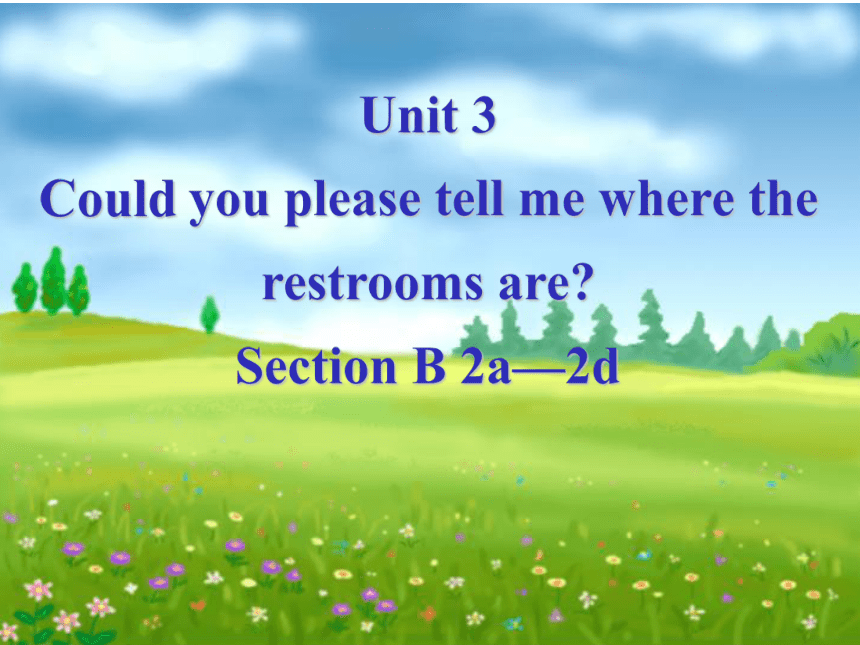 | |
| 格式 | zip | ||
| 文件大小 | 2.5MB | ||
| 资源类型 | 教案 | ||
| 版本资源 | 人教新目标(Go for it)版 | ||
| 科目 | 英语 | ||
| 更新时间 | 2022-03-03 22:06:44 | ||
图片预览


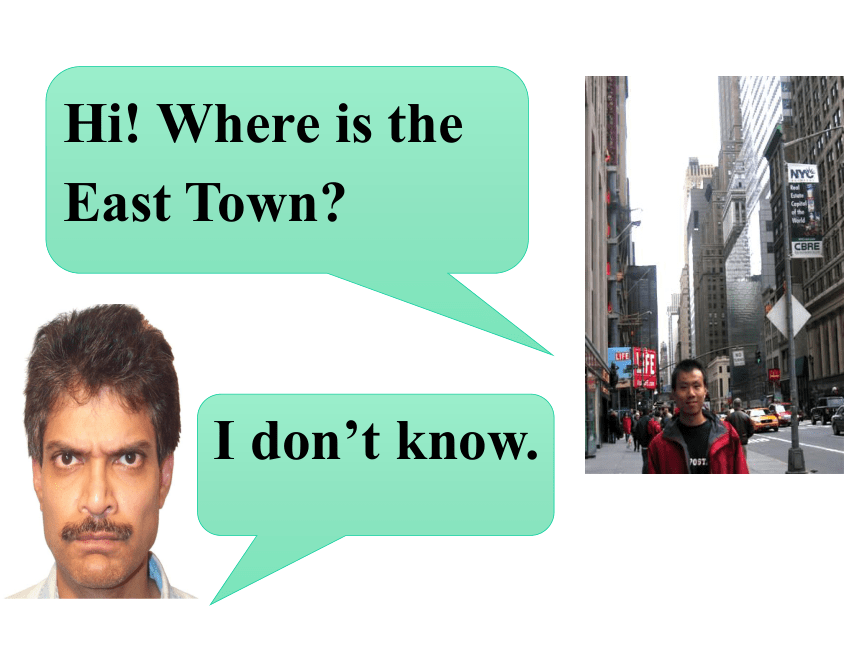
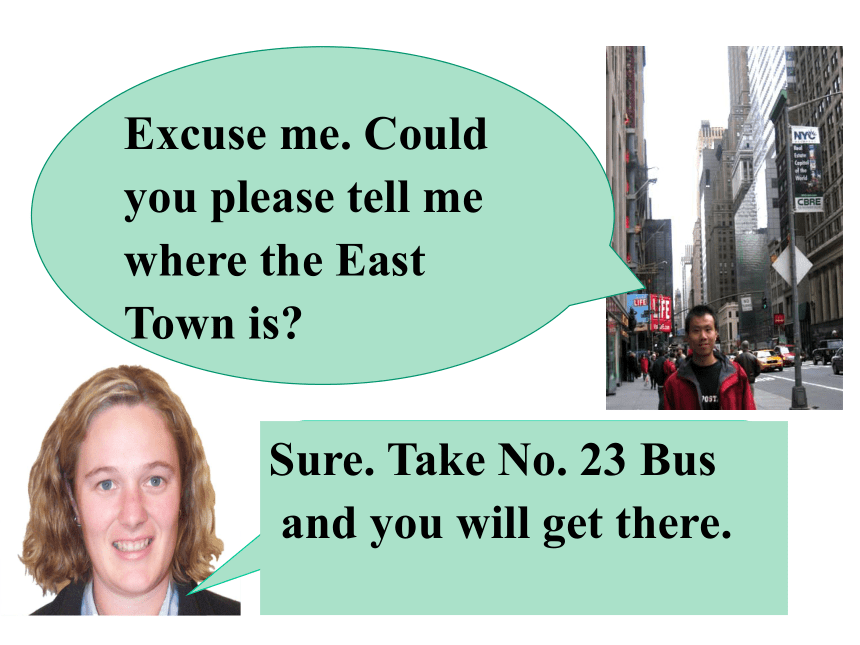
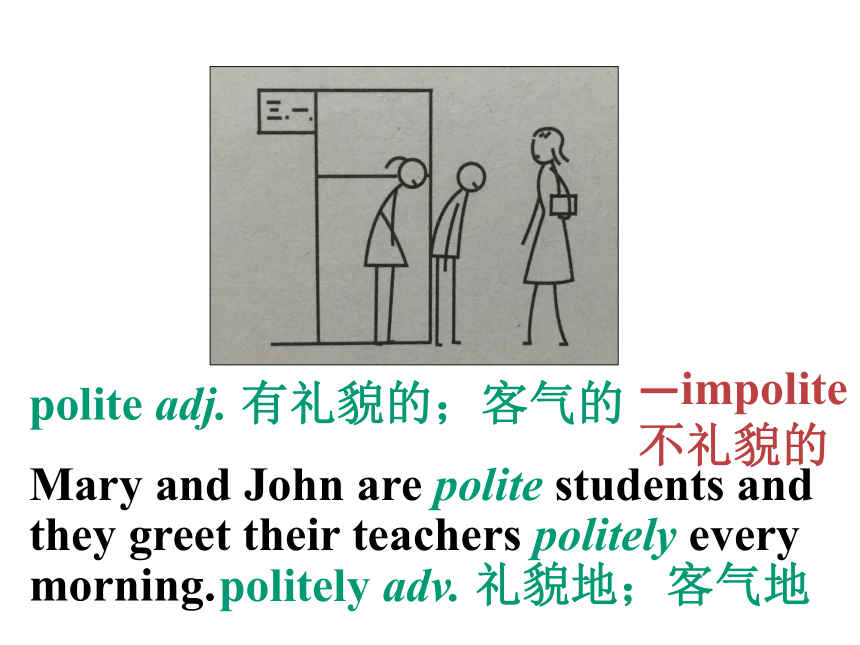
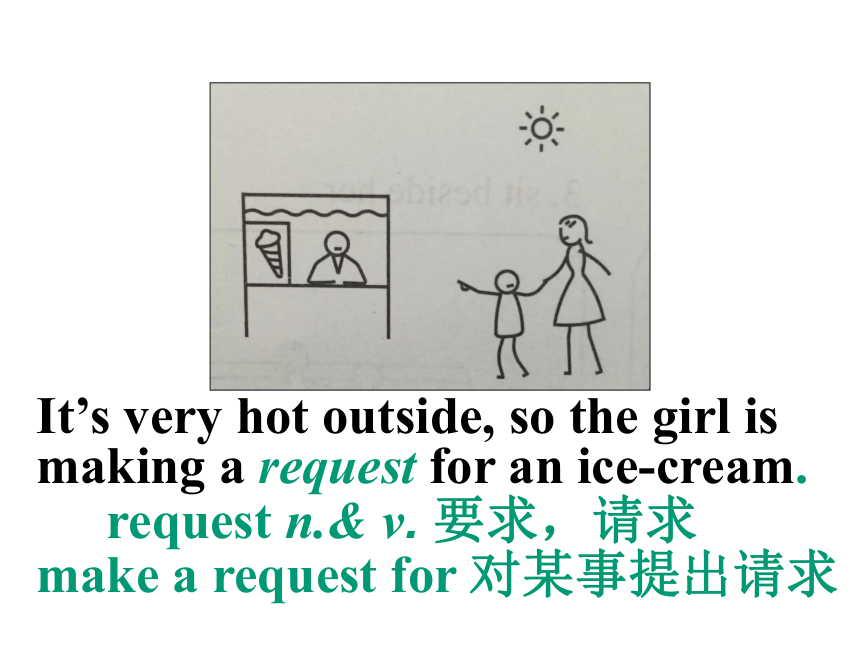
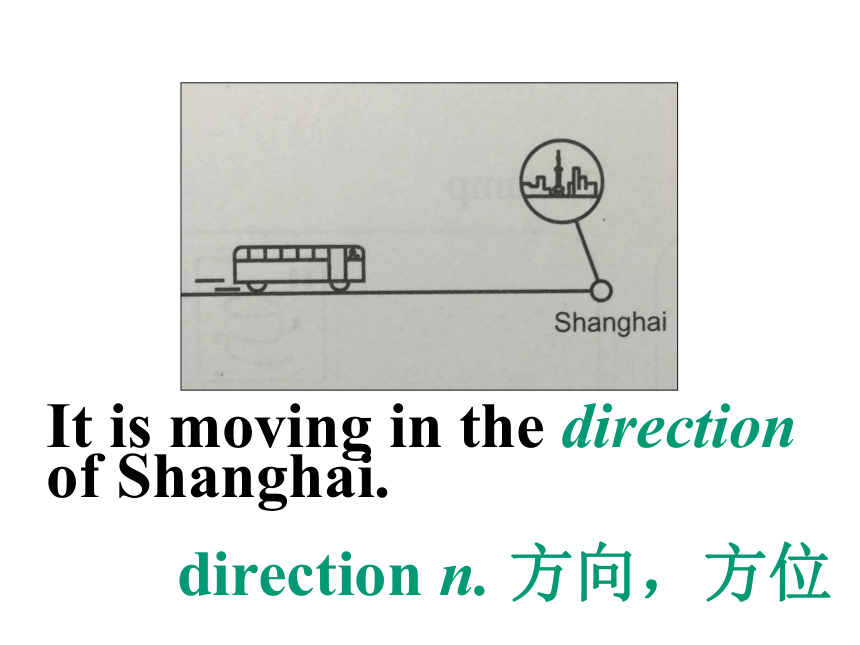
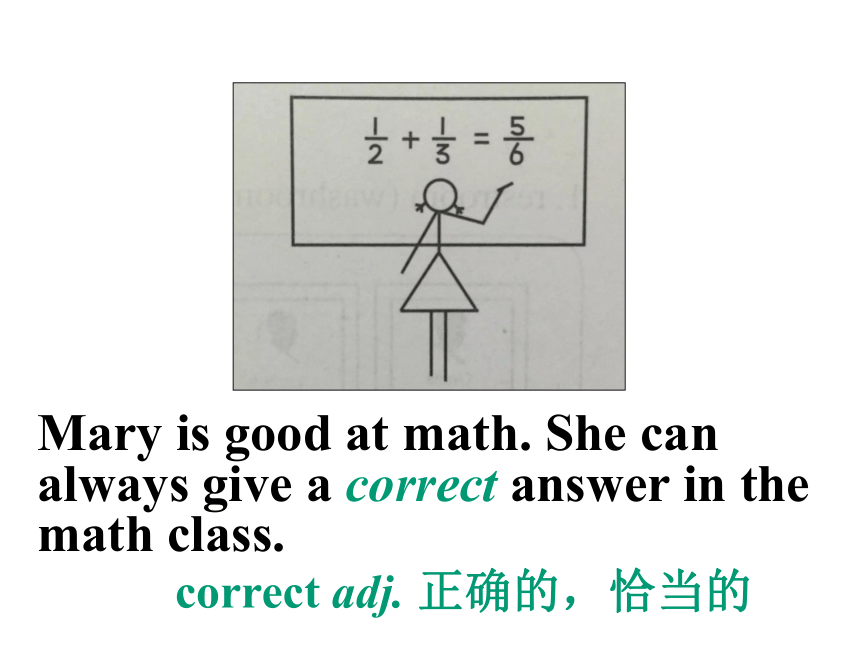

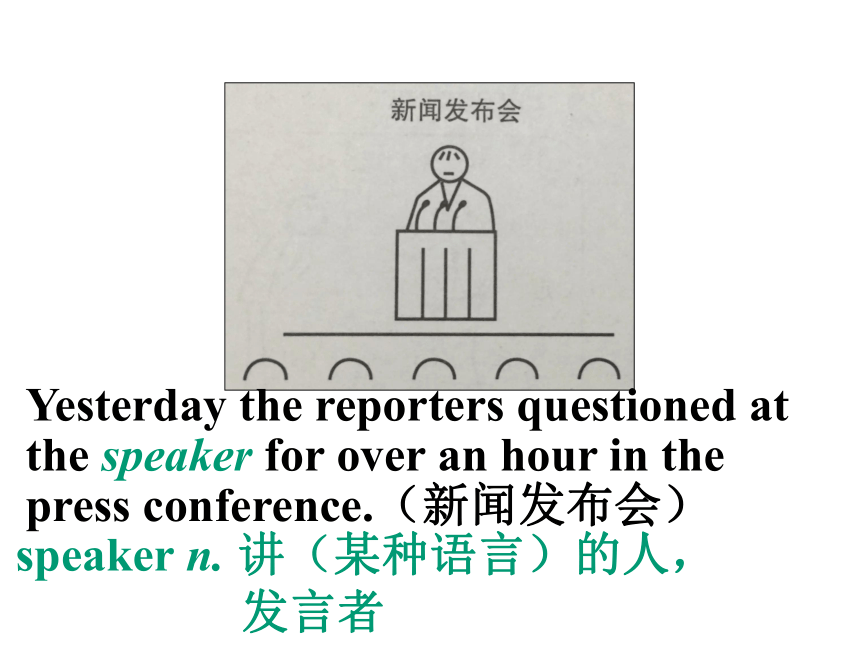
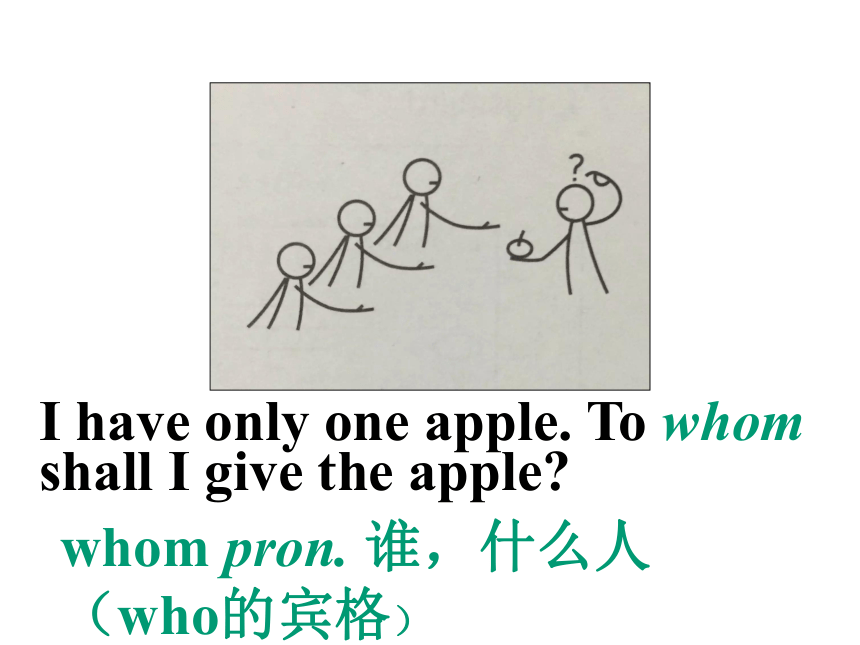
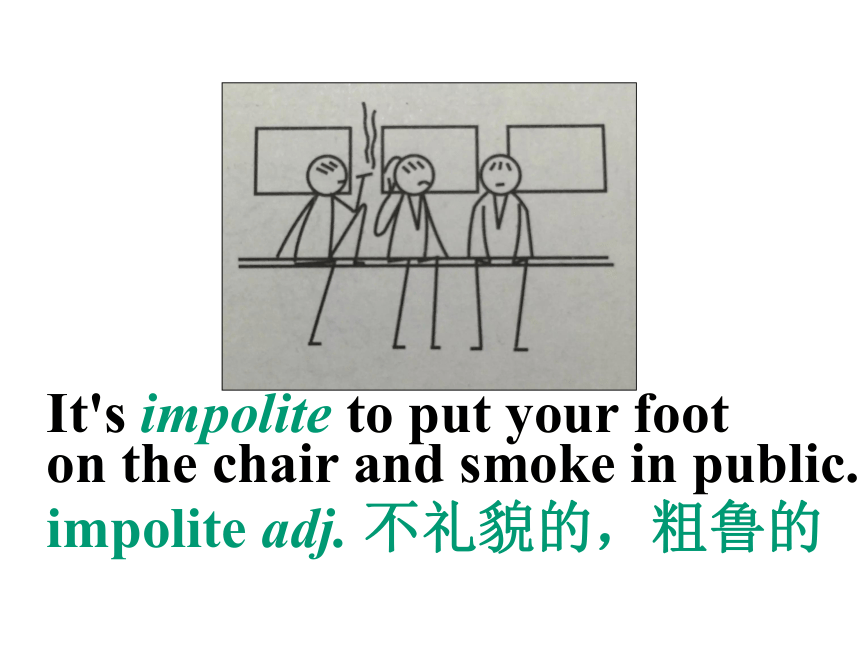
文档简介
(共41张PPT)
Unit 3
Could you please tell me where the restrooms are
Section B 2a—2d
Wang Ming is traveling in the USA.
He wants to go to a small town but he doesn’t know the way now.
Hi! Where is the East Town
I don’t know.
Excuse me. Could you please tell me where the East Town is
Sure. Take No. 23 Bus
and you will get there.
Mary and John are polite students and they greet their teachers politely every morning.
polite adj. 有礼貌的;客气的
politely adv. 礼貌地;客气地
—impolite不礼貌的
It’s very hot outside, so the girl is making a request for an ice-cream.
request n.& v. 要求,请求
make a request for 对某事提出请求
It is moving in the direction of Shanghai.
direction n. 方向,方位
Mary is good at math. She can always give a correct answer in the math class.
correct adj. 正确的,恰当的
It’s very convenient to go from Beijing to Shanghai because there is a direct flight now.
direct adj. 直接的,直率的
Yesterday the reporters questioned at the speaker for over an hour in the press conference.(新闻发布会)
speaker n. 讲(某种语言)的人,
发言者
I have only one apple. To whom shall I give the apple
whom pron. 谁,什么人(who的宾格)
impolite adj. 不礼貌的,粗鲁的
It's impolite to put your foot
on the chair and smoke in public.
—Do you know Liu Jun's address
—Yes, it's here, on the envelop.
address n. 地址,住址
You can travel around Beijing by underground.
underground n. 地铁
underground adj. 地下的
There is an underground parking lot here.
parking lot 停车场
New words
politely
礼貌地;客气地
要求;请求
方向
正确的;恰当的
有礼貌的;客气的
直接的;直率的
request
direction
correct
polite
direct
speaker
讲某种语言的人; 发言者
谁;什么人(作宾语)
不礼貌的;粗鲁的
住址;地址
地下的;地铁
停车场
New words
whom
impolite
address
underground
parking lot
Excuse me. Could you please tell me where the East Town is
Sure. Take No. 23 Bus
and you will get there.
Pre-reading
2a
Where do you need to make
polite requests Think of
some possible situations.
1)In a foreign country.
2)In public places like a bank, a post office, a library, a shopping mall,…
3)At school.
4)At home, especially when speaking to your elders.
Read the article and underline the topic sentence for each paragraph.
2b
While-reading
Could You Please ...
When you visit a foreign country, it is important to know how to ask for help politely. For example, you may ask“ Where are the restrooms ” or “Could you please tell me where the restrooms are ” These are similar requests for directions. Both are correct, but the first one sounds less polite. That is because it is a very direct question. It is not enough to just ask a question correctly. We also need to learn how to be polite when we ask for help.
Good speakers change the way they speak in different situations. The expressions they use might depend on whom they are speaking to or how well they know each other. It is all right to ask direct questions to your classmates because you know them well. However, If you say to your teacher, “When is the school trip ”, this might sound impolite. But if you say, “Excuse me, Mr. West. Do you know when the school trip is ”, this will sound much more polite.
Usually polite questions are longer. They include expressions such as “Could you please ... ” or “May I ask ... ” It sounds more polite to say, “Peter, could you please tell me your e-mail address ” than “Peter, tell me your e-mail address.” Sometimes we even need to spend time leading in to a request. For example, we might first say to a stranger, “Excuse me, I wonder if you can help me” or “I’m sorry to trouble you, but ...” before asking for help.
It might seem more difficult to speak politely than directly. However, it is important to learn how to use the right language in different situations. This will help you communicate better with other people.
( ) 1. Knowing how to ask for information
politely is important.
( ) 2. Knowing how to use correct language
is enough when you make requests.
Could You Please ...
When you visit a foreign country, it is important to know how to ask for help politely. For example, you may ask“ Where are the restrooms ” or “Could you please tell me where the restrooms are ” These are similar requests for directions. Both are correct, but the first one sounds less polite. That is because it is a very direct question. It is not enough to just ask a question correctly. We also need to learn how to be polite when we ask for help.
( ) 1. Knowing how to ask for information
politely is important.
T
Could You Please ...
When you visit a foreign country, it is important to know how to ask for help politely. For example, you may ask“ Where are the restrooms ” or “Could you please tell me where the restrooms are ” These are similar requests for directions. Both are correct, but the first one sounds less polite. That is because it is a very direct question. It is not enough to just ask a question correctly. We also need to learn how to be polite when we ask for help.
( ) 2. Knowing how to use correct language
is enough when you make requests.
F
What do you need to think about when you talk to different people
We need to think about whom we are speaking to or how well we know them.
Good speakers change the way they speak in different situations..
The expressions they use might depend on whom you are speaking to or how well they know each other. It is all right to ask direct questions to your claasmates because you know them well. If you say to your teacher, “When is the school trip ”this might sound impolite. But if you say, “Excuse me, Mr. West,Do you knowwhen the school trip is ”this will sound more polite. .
What can lead in to a request with a stranger on the street
“Excuse me, I wonder if you can help me” or “I’m sorry to trouble you, but …” before asking for help.
Usually Polite questions are longer.They include expressions such as “Could you please tell me… ” or “MayI ask… ”It sounds more polite to say, “Peter, Could you please tell me your e-mail
address ”than “tell me yoir address.” We even need to spend time leading into a request. We might say to a stranger “Excuse me, I wonder if you can help me”or “I'm sorry to trouble you, but…”before asking for help.
Read Para2&3 again and find all the
direct questions and polite requests .
1.
2.
direct questions
When is the
school trip
Peter, tell me
your e-mail
address.
polite requests
1.
2.
Excuse me, Mr. West.Do you know when the school trip is
Peter, could you
please tell me your e-mail address
It might seem more _________ to speak politely than _________. It is important to learn how to use ______ ________ in different situations. This will also help you _____________ better with other people.
difficult
directly
right
language
communicate
make requests
direct questions
polite questions
Where are the restrooms
Could you please tell me…
When is the school trip
examples:
to whom:
people you know well
examples:
to whom:
Excuse me, do you know…
teachers,strangers,
the elders…
feature
longer
Could you please tell me…
May I ask…
I wonder if you can help me…
I 'm sorry to trouble you,but…
It is important to learn how to use ____language in _______ situations.
right
different
complete the mind map
Where is the post office
…… ……
Task:
Task:
I
I'll give some of you notes(纸条),and every one of you will pick out(挑选出)one of the notes. On the notes there are some different situations. you need to say “direct questions” or “polite requests”according to different situations.
Both are correct, but the first one sounds less polite.
less + 形容词或副词, 构成降级比较形式, 相当于中文“不那么; 稍许不……”之意。
e.g. His second movie is_____________ .
他的第二部电影就没那么有趣。
Language points
less interesting
2. It might seem more difficult to speak
politely than directly.
情态动词might 表达一种可能性
与may相当, 表示“有可能, 也许会”, 但语气更加委婉, 更不确定。
e.g. He__________, but it’s very unlikely.
他也许会来,但非常靠不住。
might come
Complete the sentences according to the Chinese meanings given.
1.These are similar _______ (请求)for _______ (方向).
2. You should ask your teacher questions _______ (礼貌地).
3. It is _______ (不礼貌的)to ask direct questions when you meet someone for the first time.
4. Good _______ (发言者)can use polite requests very well.
5. It is ____ (正确的)to use the polite request.
6. The expressions they use depend on _______ (谁)they are speaking to.
requests
directions
politely
impolite
speakers
whom
correct
USING SUITABLE LANGUAGE(使用合适的语言)
In different situations, you need to choose and use suitable language based on cultural knowledge.
在不同的情境中,你需要选择和使用以文化知识为基础的合适的语言。
Reading strategy
Read the requests below. In the second column, write A if you would say it to someone you know and B if you would say it to a stranger. In the last column, write where you think these people are.
2d
Post-reading
Request Person Place
1. Will you pass the salt
2. Do you know where I can
change some money, please
3. Could you tell me what just
happened
4. Can you please tell me where
the nearest station is
5. Excuse me, do you know
what time it begins, please
6. Let me know when you’re
ready, OK
7. Could you possibly tell me
the way to the village school
A
home/restaurant
B
street
A/B
any public place/home
B
B
B
A
movie theater/
concert hall
street
home
street
2. New words and expressions
1.Reading Strategy:
Using suitable language
3. How can we make polite requests
and use suitable language in different
situations
Homework:
Please make up a conversation of making requests to your parents, friends or your teachers.
Unit 3
Could you please tell me where the restrooms are
Section B 2a—2d
Wang Ming is traveling in the USA.
He wants to go to a small town but he doesn’t know the way now.
Hi! Where is the East Town
I don’t know.
Excuse me. Could you please tell me where the East Town is
Sure. Take No. 23 Bus
and you will get there.
Mary and John are polite students and they greet their teachers politely every morning.
polite adj. 有礼貌的;客气的
politely adv. 礼貌地;客气地
—impolite不礼貌的
It’s very hot outside, so the girl is making a request for an ice-cream.
request n.& v. 要求,请求
make a request for 对某事提出请求
It is moving in the direction of Shanghai.
direction n. 方向,方位
Mary is good at math. She can always give a correct answer in the math class.
correct adj. 正确的,恰当的
It’s very convenient to go from Beijing to Shanghai because there is a direct flight now.
direct adj. 直接的,直率的
Yesterday the reporters questioned at the speaker for over an hour in the press conference.(新闻发布会)
speaker n. 讲(某种语言)的人,
发言者
I have only one apple. To whom shall I give the apple
whom pron. 谁,什么人(who的宾格)
impolite adj. 不礼貌的,粗鲁的
It's impolite to put your foot
on the chair and smoke in public.
—Do you know Liu Jun's address
—Yes, it's here, on the envelop.
address n. 地址,住址
You can travel around Beijing by underground.
underground n. 地铁
underground adj. 地下的
There is an underground parking lot here.
parking lot 停车场
New words
politely
礼貌地;客气地
要求;请求
方向
正确的;恰当的
有礼貌的;客气的
直接的;直率的
request
direction
correct
polite
direct
speaker
讲某种语言的人; 发言者
谁;什么人(作宾语)
不礼貌的;粗鲁的
住址;地址
地下的;地铁
停车场
New words
whom
impolite
address
underground
parking lot
Excuse me. Could you please tell me where the East Town is
Sure. Take No. 23 Bus
and you will get there.
Pre-reading
2a
Where do you need to make
polite requests Think of
some possible situations.
1)In a foreign country.
2)In public places like a bank, a post office, a library, a shopping mall,…
3)At school.
4)At home, especially when speaking to your elders.
Read the article and underline the topic sentence for each paragraph.
2b
While-reading
Could You Please ...
When you visit a foreign country, it is important to know how to ask for help politely. For example, you may ask“ Where are the restrooms ” or “Could you please tell me where the restrooms are ” These are similar requests for directions. Both are correct, but the first one sounds less polite. That is because it is a very direct question. It is not enough to just ask a question correctly. We also need to learn how to be polite when we ask for help.
Good speakers change the way they speak in different situations. The expressions they use might depend on whom they are speaking to or how well they know each other. It is all right to ask direct questions to your classmates because you know them well. However, If you say to your teacher, “When is the school trip ”, this might sound impolite. But if you say, “Excuse me, Mr. West. Do you know when the school trip is ”, this will sound much more polite.
Usually polite questions are longer. They include expressions such as “Could you please ... ” or “May I ask ... ” It sounds more polite to say, “Peter, could you please tell me your e-mail address ” than “Peter, tell me your e-mail address.” Sometimes we even need to spend time leading in to a request. For example, we might first say to a stranger, “Excuse me, I wonder if you can help me” or “I’m sorry to trouble you, but ...” before asking for help.
It might seem more difficult to speak politely than directly. However, it is important to learn how to use the right language in different situations. This will help you communicate better with other people.
( ) 1. Knowing how to ask for information
politely is important.
( ) 2. Knowing how to use correct language
is enough when you make requests.
Could You Please ...
When you visit a foreign country, it is important to know how to ask for help politely. For example, you may ask“ Where are the restrooms ” or “Could you please tell me where the restrooms are ” These are similar requests for directions. Both are correct, but the first one sounds less polite. That is because it is a very direct question. It is not enough to just ask a question correctly. We also need to learn how to be polite when we ask for help.
( ) 1. Knowing how to ask for information
politely is important.
T
Could You Please ...
When you visit a foreign country, it is important to know how to ask for help politely. For example, you may ask“ Where are the restrooms ” or “Could you please tell me where the restrooms are ” These are similar requests for directions. Both are correct, but the first one sounds less polite. That is because it is a very direct question. It is not enough to just ask a question correctly. We also need to learn how to be polite when we ask for help.
( ) 2. Knowing how to use correct language
is enough when you make requests.
F
What do you need to think about when you talk to different people
We need to think about whom we are speaking to or how well we know them.
Good speakers change the way they speak in different situations..
The expressions they use might depend on whom you are speaking to or how well they know each other. It is all right to ask direct questions to your claasmates because you know them well. If you say to your teacher, “When is the school trip ”this might sound impolite. But if you say, “Excuse me, Mr. West,Do you knowwhen the school trip is ”this will sound more polite. .
What can lead in to a request with a stranger on the street
“Excuse me, I wonder if you can help me” or “I’m sorry to trouble you, but …” before asking for help.
Usually Polite questions are longer.They include expressions such as “Could you please tell me… ” or “MayI ask… ”It sounds more polite to say, “Peter, Could you please tell me your e-mail
address ”than “tell me yoir address.” We even need to spend time leading into a request. We might say to a stranger “Excuse me, I wonder if you can help me”or “I'm sorry to trouble you, but…”before asking for help.
Read Para2&3 again and find all the
direct questions and polite requests .
1.
2.
direct questions
When is the
school trip
Peter, tell me
your e-mail
address.
polite requests
1.
2.
Excuse me, Mr. West.Do you know when the school trip is
Peter, could you
please tell me your e-mail address
It might seem more _________ to speak politely than _________. It is important to learn how to use ______ ________ in different situations. This will also help you _____________ better with other people.
difficult
directly
right
language
communicate
make requests
direct questions
polite questions
Where are the restrooms
Could you please tell me…
When is the school trip
examples:
to whom:
people you know well
examples:
to whom:
Excuse me, do you know…
teachers,strangers,
the elders…
feature
longer
Could you please tell me…
May I ask…
I wonder if you can help me…
I 'm sorry to trouble you,but…
It is important to learn how to use ____language in _______ situations.
right
different
complete the mind map
Where is the post office
…… ……
Task:
Task:
I
I'll give some of you notes(纸条),and every one of you will pick out(挑选出)one of the notes. On the notes there are some different situations. you need to say “direct questions” or “polite requests”according to different situations.
Both are correct, but the first one sounds less polite.
less + 形容词或副词, 构成降级比较形式, 相当于中文“不那么; 稍许不……”之意。
e.g. His second movie is_____________ .
他的第二部电影就没那么有趣。
Language points
less interesting
2. It might seem more difficult to speak
politely than directly.
情态动词might 表达一种可能性
与may相当, 表示“有可能, 也许会”, 但语气更加委婉, 更不确定。
e.g. He__________, but it’s very unlikely.
他也许会来,但非常靠不住。
might come
Complete the sentences according to the Chinese meanings given.
1.These are similar _______ (请求)for _______ (方向).
2. You should ask your teacher questions _______ (礼貌地).
3. It is _______ (不礼貌的)to ask direct questions when you meet someone for the first time.
4. Good _______ (发言者)can use polite requests very well.
5. It is ____ (正确的)to use the polite request.
6. The expressions they use depend on _______ (谁)they are speaking to.
requests
directions
politely
impolite
speakers
whom
correct
USING SUITABLE LANGUAGE(使用合适的语言)
In different situations, you need to choose and use suitable language based on cultural knowledge.
在不同的情境中,你需要选择和使用以文化知识为基础的合适的语言。
Reading strategy
Read the requests below. In the second column, write A if you would say it to someone you know and B if you would say it to a stranger. In the last column, write where you think these people are.
2d
Post-reading
Request Person Place
1. Will you pass the salt
2. Do you know where I can
change some money, please
3. Could you tell me what just
happened
4. Can you please tell me where
the nearest station is
5. Excuse me, do you know
what time it begins, please
6. Let me know when you’re
ready, OK
7. Could you possibly tell me
the way to the village school
A
home/restaurant
B
street
A/B
any public place/home
B
B
B
A
movie theater/
concert hall
street
home
street
2. New words and expressions
1.Reading Strategy:
Using suitable language
3. How can we make polite requests
and use suitable language in different
situations
Homework:
Please make up a conversation of making requests to your parents, friends or your teachers.
同课章节目录
- Unit 1 How can we become good learners.
- Section A
- Section B
- Unit 2 I think that mooncakes are delicious!
- Section A
- Section B
- Unit 3 Could you please tell me where the restroom
- Section A
- Section B
- Unit 4 I used to be afraid of the dark.
- Section A
- Section B
- Unit 5 What are the shirts made of?
- Section A
- Section B
- Review of Units 1-5
- Unit 6 When was it invented?
- Section A
- Section B
- Unit 7 Teenagers should be allowed to choose their
- Section A
- Section B
- Unit 8 It must belong to Carla.
- Section A
- Section B
- Unit 9 I like music that I can dance to.
- Section A
- Section B
- Unit 10 You're supposed to shake hands.
- Section A
- Section B
- Review of Units 6-10
- Unit 11 Sad movies make me cry.
- Section A
- Section B
- Unit 12 Life is full of the unexpected
- Section A
- Section B
- Unit 13 We're trying to save the earth!
- Section A
- Section B
- Unit 14 I remember meeting all of you in Grade 7.
- Section A
- Section B
- Review of Units 11-14
